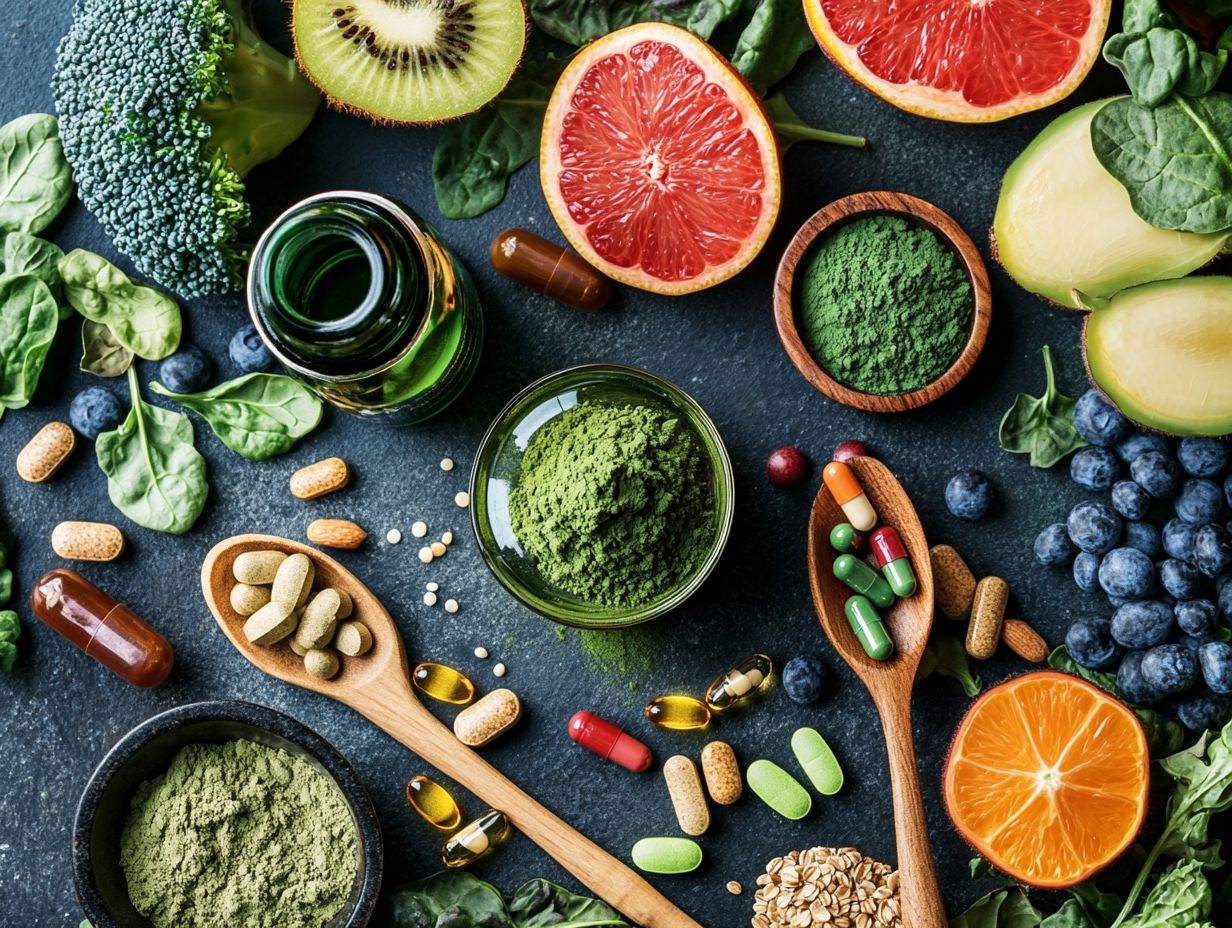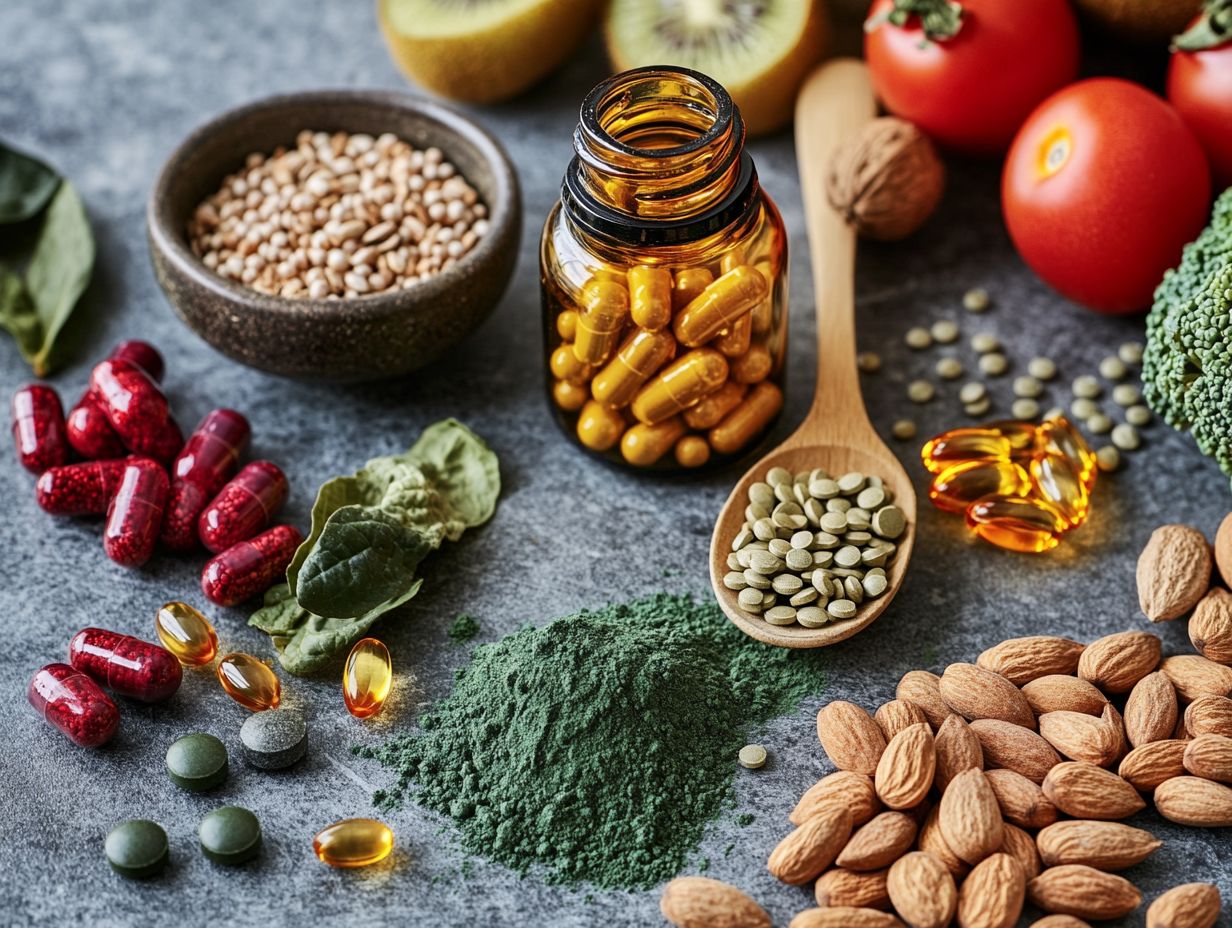What Are Common Dietary Supplements in Holistic Nutrition?
In today s health-conscious landscape, dietary supplements have become essential components of holistic nutrition. Start exploring how these supplements can transform your health today!
With a wide range of options from vitamins and minerals to herbal supplements and probiotics there s something tailored to enhance your well-being.
This article delves into 15 commonly used supplements, exploring their benefits and how they can support a balanced lifestyle.
Whether you re looking to boost your immunity, improve digestion, or enhance overall vitality, understanding these supplements equips you to make informed choices for your health.
Contents
- Key Takeaways:
- 1. Vitamins and Minerals
- 2. Probiotics
- 3. Omega-3 Fatty Acids
- 4. Herbal Supplements
- 5. Protein Powders
- 6. Collagen
- 7. Unlock the Power of Adaptogens
- 8. Revitalize Your Digestion with Enzymes
- 9. The Essential Role of Fiber Supplements
- 10. Discover the Healing Benefits of Essential Oils
- 11. Amino Acids
- 12. Antioxidants
- 13. Multivitamins
- 14. Prebiotics
- 15. Electrolytes
- Frequently Asked Questions
Key Takeaways:

- Vitamins and minerals maintain overall health and are commonly taken in holistic nutrition.
- Probiotics balance the gut microbiome, improving digestion, immunity, and mental health.
- Omega-3 fatty acids are crucial for brain function, heart health, and reducing inflammation. Common sources include fish oil and flaxseed oil.
1. Vitamins and Minerals
Vitamins and minerals are essential dietary supplements. They play a crucial role in maintaining your optimal health.
These nutrients help address deficiencies and support various bodily functions, including immune health, bone strength, and chronic disease prevention. Key players like Vitamin D and Vitamin C, along with minerals such as calcium and magnesium, are vital for your overall wellness. Don t wait make sure to include these in your balanced diet now!
Each vitamin and mineral offers unique benefits to your well-being. For example, Vitamin A supports your vision and skin health, while Vitamin E acts as a powerful antioxidant, protecting your cells from damage.
The recommended daily value of Vitamin D is 600 IU, typically obtained from fortified foods or a little sunlight. Calcium, essential for bone development, has a daily target of 1,000 mg, which you can find in dairy products or leafy greens.
Research emphasizes the importance of these nutrients. A study published in the Journal of Nutrition highlighted a correlation between adequate magnesium intake and a reduced risk of heart disease. Dietary supplements can effectively bridge the gap for those unable to meet their nutritional needs solely through food, ultimately enhancing your overall health outcomes.
2. Probiotics
Probiotics are the beneficial microorganisms that play an important role in promoting your gut health and enhancing your immune system, making them a popular choice in dietary supplements.
These tiny allies, often dubbed ‘good bacteria’, are found in a range of fermented foods like yogurt, kefir, sauerkraut, and kimchi. Each strain offers unique benefits; for instance, Lactobacillus rhamnosus is renowned for easing digestive woes such as diarrhea, while Bifidobacterium lactis aids in maintaining regular bowel movements.
Studies show that these tiny microorganisms can protect you from chronic diseases, including heart disease and diabetes, by helping regulate inflammation and boosting nutrient absorption. By incorporating a variety of probiotic sources into your diet, you can cultivate a balanced gut microbiome, which contributes positively to your overall health.
3. Omega-3 Fatty Acids
Omega-3 fatty acids are celebrated for their health benefits. They particularly excel in supporting heart health and reducing inflammation.
These essential fats mainly consist of two key types: EPA (eicosapentaenoic acid) and DHA (docosahexaenoic acid). Both are crucial for various bodily functions. While EPA is known for its ability to reduce inflammation, DHA is important for brain health and cognitive function.
You can find rich sources of these omega-3s in fatty fish like salmon, mackerel, and sardines. They are also available in algae-based supplements, which are especially beneficial for those following vegetarian or vegan diets.
Clinical studies show that regular consumption of omega-3 fatty acids can lower the risk of heart disease, enhance joint health, and assist in managing mental health disorders. This establishes a strong connection between these nutrients and your overall well-being.
4. Herbal Supplements
Herbal supplements like echinacea and St. John s Wort come from natural ingredients and have been valued for centuries for their potential to support various health conditions while enhancing overall wellness.
Many individuals seek these remedies to alleviate symptoms related to anxiety, depression, and immune system support. While some herbal supplements may offer benefits, it s crucial to consider their effectiveness supported by science.
Be mindful of potential side effects, which can range from mild digestive upset to serious allergic reactions. Given the lack of strict FDA regulation, purity and potency are not always guaranteed.
This emphasizes the importance of conducting thorough research and consulting healthcare professionals before adding these supplements to your routine. Your health deserves informed choices.
5. Protein Powders

Protein powders have become staples in many diets, providing essential amino acids crucial for muscle health, recovery, and nutrient absorption.
Among the options available, whey protein stands out due to its rapid digestion and high leucine content, making it effective for muscle building. If you prefer something that digests slowly, casein is an excellent choice for supporting muscle recovery overnight.
For individuals with dietary restrictions like vegans or those with lactose intolerance plant-based options such as pea, hemp, and brown rice proteins offer great alternatives.
Each type of protein powder brings unique benefits and can seamlessly blend into a balanced diet. Whether you enjoy it as a post-workout shake, mix it into smoothies, or use it in your baking, meeting your protein needs has never been easier!
6. Collagen
Collagen supplements are taking the wellness world by storm, and it’s easy to see why! They offer a range of potential health benefits, especially for your skin health and joint function as part of a holistic wellness routine.
This growing interest is driven by the different types of collagen, namely types I, II, and III, each with unique advantages. Type I is prevalent in your skin, tendons, and bones, playing a crucial role in maintaining skin elasticity. Meanwhile, type II is essential for joint health, as it is a key component of cartilage.
You can source collagen from both animal and marine origins, such as bone broth and fish, or explore plant-based supplements designed to stimulate your body s own collagen production.
Clinical studies, including double-blind trials, show that these supplements can enhance skin hydration and elasticity while alleviating joint pain. This can ultimately elevate your overall quality of life.
7. Unlock the Power of Adaptogens
Adaptogens represent a remarkable category of herbal supplements designed to help your body adapt to stress and enhance your overall well-being.
Among these potent herbs, ashwagandha shines for its effectiveness in reducing anxiety and boosting stamina. Meanwhile, rhodiola has earned a reputation for its ability to elevate energy levels and fight fatigue. Integrating these supplements into your daily routine is incredibly simple whether you blend them into smoothies, stir them into teas, or take them in capsule form. They re ideal for anyone seeking balance in a hectic lifestyle.
Research indicates that consistent use could lead to improved concentration and resilience. As your body becomes more resilient, you ll discover an increased capacity to not just endure stress, but to truly thrive in the midst of it. Don t wait! Start your journey to better health today with these natural solutions.
8. Revitalize Your Digestion with Enzymes
Enzymes play a crucial role in maintaining digestive health, and enzyme supplements can make a big difference for those facing digestive issues or nutrient absorption challenges.
Discover a variety of powerful supplements designed just for you, including proteases for protein digestion, lipases for fats, and amylases for carbohydrates, providing targeted support to meet your unique needs. When you experience bloating, gas, or discomfort after meals, these enzyme aids can effectively break down food, making it easier for your body to absorb essential nutrients.
For individuals with certain health conditions, such as lactose intolerance or pancreatic insufficiency, enzyme supplements can be necessary to enhance overall digestive function. By incorporating these products into your routine, you can elevate your digestive experience, ultimately leading to improved health and well-being.
9. The Essential Role of Fiber Supplements
Fiber supplements are essential for sustaining your digestive health and can significantly enhance nutrient absorption while helping you manage your weight.
Understanding the different types of fiber helps achieve optimal gut health. Soluble fiber, found in foods like oats, beans, and apples, dissolves in water to create a gel-like substance that aids in regulating cholesterol and stabilizing blood sugar levels. In contrast, insoluble fiber, present in whole grains, nuts, and vegetables, adds bulk to your stool and promotes regularity by facilitating the movement of food through the digestive tract.
These fibers are instrumental in preventing chronic diseases such as heart disease and diabetes, ultimately boosting your overall well-being. Don t hesitate start enhancing your health with fiber today!
10. Discover the Healing Benefits of Essential Oils

Essential oils are concentrated extracts from plants that offer a wealth of health benefits, commonly utilized in aromatherapy and as natural ingredients in dietary supplements. These oils encapsulate the aromatic compounds of their source plants, significantly influencing both your physical and emotional well-being.
Take, for example, lavender essential oil, renowned for its calming effects. It’s often your go-to for stress relief and improving sleep quality. Meanwhile, peppermint oil is celebrated for its invigorating properties, helping you sharpen your focus and ease headaches.
The science behind these benefits lies in the natural substances that affect your body s systems and interact with your body s olfactory system. Through mechanisms such as balancing brain chemicals and reducing inflammation, essential oils can serve as effective complementary treatments, promoting a holistic approach to your health and wellness journey. Explore the power of essential oils and transform your life today!
11. Amino Acids
Amino acids are the fundamental building blocks of proteins. They are vital for protein synthesis. This makes amino acid supplements a valuable addition for athletes and anyone looking to enhance their health.
Amino acids fall into two main categories: essential and non-essential. Essential amino acids are those your body cannot produce on its own, so you must obtain them through your diet. Good sources include meat, eggs, and legumes.
On the other hand, non-essential amino acids can be synthesized by your body. You can find them in foods like nuts, tofu, and dairy products.
Both types of amino acids contribute significantly to various health benefits. These include improved muscle recovery, enhanced immune function, and better mood regulation. Prioritizing a balanced intake of these amino acids is essential for your overall well-being.
12. Antioxidants
Antioxidants, such as vitamin E and vitamin C, are remarkable compounds. They combat oxidative stress, which is harm caused by unstable molecules. This significantly aids in preventing chronic diseases and enhancing overall health.
You can discover these powerful allies in a wide array of sources. Look for vibrant fruits like berries and citrus, as well as vegetables, nuts, and whole grains. These nutrients neutralize free radicals in your body. This protects your cells from damage and helps slow the aging process.
Research has highlighted numerous potential health benefits associated with consuming antioxidants. These benefits include improved heart health, enhanced immune function, and reduced inflammation. Incorporate antioxidant-rich foods into your daily diet to reap the rewards of these protective compounds!
13. Multivitamins
Multivitamins offer a convenient way to ensure you’re getting the nutrients you need. They help address missing nutrients in your diet and support your overall wellness as recommended by doctors and nutritionists.
These supplements fill nutritional gaps that can result from poor dietary habits or lifestyle choices. For example, certain vitamins like B12 are crucial for energy production and proper neurological function. Additionally, understanding functional foods in holistic nutrition can further enhance your dietary choices, as vitamin D plays a key role in maintaining bone health and boosting your immune system.
Minerals such as magnesium and zinc are also vital. They contribute to various bodily functions, including muscle performance and immune defense.
If you have specific dietary restrictions, like being vegan or having allergies, you may find multivitamins especially beneficial. It’s wise to consult with a healthcare provider before starting a multivitamin regimen. This ensures it aligns perfectly with your personal health needs and nutritional guidelines.
14. Prebiotics
Prebiotics are non-digestible fibers. They play a crucial role in nurturing the growth of beneficial bacteria in your gut. This ultimately supports gut health and amplifies the effects of probiotics.
You can find these fibers in delicious foods like bananas, onions, garlic, and whole grains. They are easy to add to your balanced diet. By feeding the good bacteria in your digestive system, prebiotics help create an environment that fosters overall digestive well-being.
When combined with probiotics those live beneficial bacteria you ll find a powerful partnership. This enhances gut flora diversity and function. This synergy not only supports your digestion but also boosts your immune response and reduces gastrointestinal issues. Incorporating both into your nutritional regimen is essential for optimal health.
15. Electrolytes

Electrolytes are essential minerals that play a pivotal role in regulating hydration, muscle function, and nerve signaling. They are crucial in dietary supplements, especially for those who lead active lifestyles.
Sodium is vital for maintaining fluid balance. It becomes particularly important during intense exercise when sweat loss can lead to dehydration. You can easily replenish your sodium levels through foods like table salt, pickles, and olives.
Potassium is your ally in muscle contractions and helps prevent cramps an absolute necessity for anyone engaging in physical activities. You’ll find potassium in foods such as bananas, sweet potatoes, and spinach.
Magnesium supports over 300 body processes, including energy production and muscle function. To keep your magnesium levels up, incorporate nuts, seeds, and whole grains into your diet.
It’s important to ensure you have enough electrolytes before, during, and after exercise. Don’t let dehydration slow you down; replenish your electrolytes for peak performance and enhanced recovery.
Frequently Asked Questions
What Are Common Dietary Supplements in Holistic Nutrition?
Some common dietary supplements in holistic nutrition include probiotics, omega-3 fatty acids, vitamin D, magnesium, turmeric, and green tea extract, which you can learn more about in the article on the role of supplements in holistic nutrition.
What Are Probiotics?
Probiotics are live microorganisms that are considered beneficial for the digestive system. They can help improve gut health, aid in digestion, and strengthen the immune system.
Why Are Omega-3 Fatty Acids Important?
Omega-3 fatty acids are essential for brain and heart health. They are also known to have anti-inflammatory properties and can help reduce the risk of chronic diseases.
What Is the Recommended Daily Intake of Vitamin D for Adults?
The recommended daily intake of vitamin D for adults is 600-800 IU. However, it may vary based on age, skin color, and overall health.
Can Magnesium Supplements Help with Anxiety and Stress?
Yes, magnesium is known to have a calming effect on the body and can help reduce anxiety and stress levels. It also plays a role in sleep quality and muscle relaxation.
Are There Any Risks or Side Effects with Dietary Supplements?
While most dietary supplements are generally safe and well-tolerated, it is crucial to consult with a healthcare professional before adding them to your diet. If you’re looking for comprehensive information, consider checking out the best resources for holistic nutrition. Some supplements may interact with medications or have side effects, especially if taken in large doses.
If you’re interested in optimizing your nutrition, consider consulting a nutritional expert for personalized advice.




